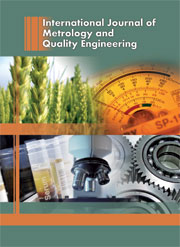Article contents
Measurement uncertainty evaluation of automatic Tan Delta and resistivity test set for transformer oil
Published online by Cambridge University Press: 26 September 2012
Abstract
Quality of transformer oil plays vital role in the performance of transformer in electrical appliances. Measurement uncertainty is a general concept associated with any measurement and can be used in professional decision processes as well as judging attributes in many domains, both theoretical and experimental. As the tolerances applied in industrial production become more demanding, the role of measurement uncertainty becomes more important when assessing conformity to these tolerances. Measurement uncertainty plays a central role in quality assessment and quality standards. In an effort to meet national, international and commercial accreditation requirements, users of transformer oil testing machines must establish adequate methods of determining calibration and test measurement uncertainties. Determining measurement uncertainty for transformer oil testing equipments and test data can be a very complex process. Many factors affect the uncertainty of test data produced by testing machines. In this paper, the concepts associated with the procedure for estimation of uncertainty is discussed and the application of these for the determination of uncertainty in transformer oil testing equipments in government testing labs is illustrated. The objective of this study is to develop a methodology for determining the result of measurement concerning electrical properties of transformer oil and their respective uncertainties.
Information
- Type
- Research Article
- Information
- International Journal of Metrology and Quality Engineering , Volume 3 , Issue 1 , 2012 , pp. 39 - 45
- Copyright
- © EDP Sciences 2012
References
- 11
- Cited by

